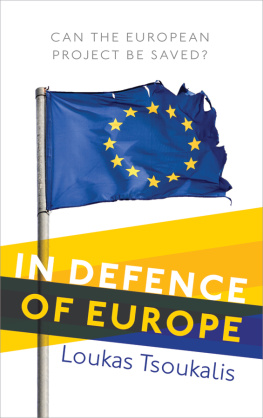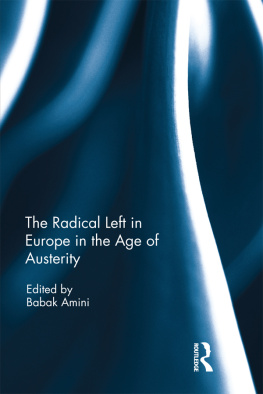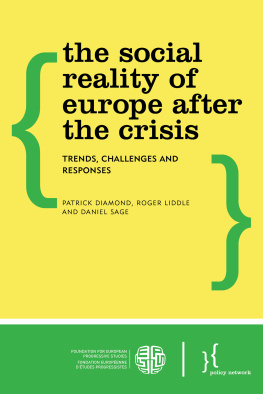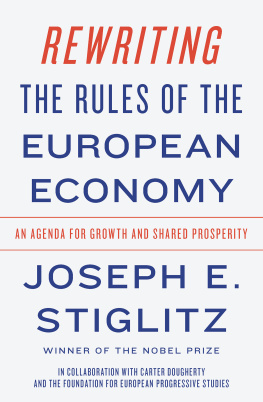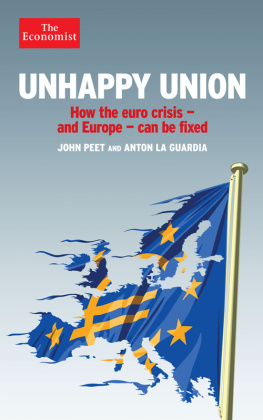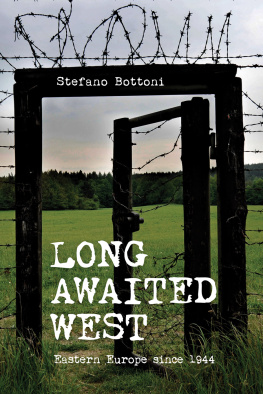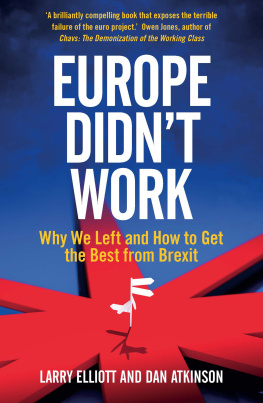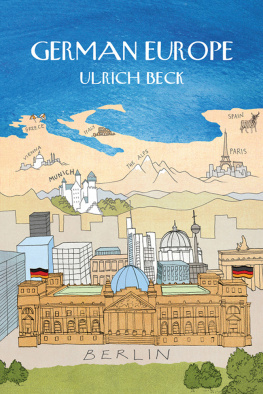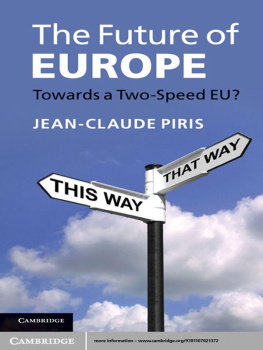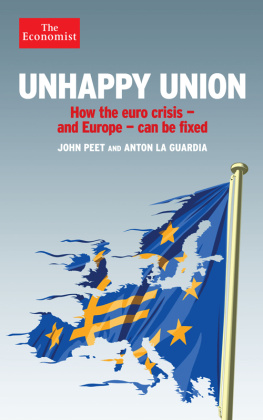Praise for In Defence of Europe
A deeply insightful book that illuminates how only a combination of skill and passion can save Europe.
Enrico Letta, former Prime Minister of Italy, Dean of Paris School of International Affairs, Sciences-Po
The European project has traditionally been driven by the regions political, business, and technocratic elites, with ordinary people indifferent and often hostile to it, even as beneficiaries. This clear-sighted, non-ideological book shows how this has to change for the project to survive. Tsoukalis argues Europe needs a wide range of reforms that deepens integration in some areas, while allowing for greater differentiation and democratic decision-making in others. He eschews simple solutions and magic pills. It is the books great virtue that it clarifies both the scale of the problem and some of the ways forward.
Dani Rodrik, Ford Foundation Professor of International Political Economy, Harvard Kennedy School
An inexorable analysis. An eye opener, a heart cry from a true European.
Herman Van Rompuy, former President of the European Council, Minister of State, Belgium
This is an important and enlightening book in which one of the most knowledgeable scholars of European integration takes a hard look at what has gone wrong over the last quarter century. Though deeply committed to the success of the European project, the authors account of present European crises is characterized not only by an unflinching realism but also by the masterly integration of economic and political analyses and by the perceptive reconstruction of the conflicting interests and (mis-) perceptions that explain German, British and Greek contributions to present policy failures. Remarkably, nevertheless, the book ends neither in a counsel of despair nor in idealistic precepts but in a series of pragmatic proposals whose usefulness is not obviously in conflict with political feasibility.
Fritz W. Scharpf, Emeritus Director of the Max Planck Institutefor the Study of Societies, Cologne
As ever thoughtful and thought-provoking, Loukas Tsoukalis prompts us to re-examine the fundamentals of contemporary European integration. His deep analysis is timely, nuanced and challenging.
Professor Dame Helen Wallace FBA, British Academy

Great Clarendon Street, Oxford, ox 2 6 dp , United Kingdom
Oxford University Press is a department of the University of Oxford. It furthers the University's objective of excellence in research, scholarship, and education by publishing worldwide. Oxford is a registered trade mark of Oxford University Press in the UK and in certain other countries
Loukas Tsoukalis 2016
The moral rights of the author have been asserted
First Edition published in 2016
Impression: 1
All rights reserved. No part of this publication may be reproduced, stored in a retrieval system, or transmitted, in any form or by any means, without the prior permission in writing of Oxford University Press, or as expressly permitted by law, by licence or under terms agreed with the appropriate reprographics rights organization. Enquiries concerning reproduction outside the scope of the above should be sent to the Rights Department, Oxford University Press, at the address above
You must not circulate this work in any other form and you must impose this same condition on any acquirer
Published in the United States of America by Oxford University Press 198 Madison Avenue, New York, NY 10016, United States of America
British Library Cataloguing in Publication Data
Data available
Library of Congress Control Number: 2016940755
ISBN 9780198755319
ebook ISBN 9780191071232
Printed in Great Britain by Clays Ltd, St Ives plc
Links to third party websites are provided by Oxford in good faith and for information only. Oxford disclaims any responsibility for the materials contained in any third party website referenced in this work
In memory of my parents who lived many years of their life on the dark side of European history and hoped we would never have to live through such times again
Contents
This book has travelled a great deal before reaching publication. The ideas contained in it have been tried out with many people from the world of policy and politics, business, journalism, and academia, and with different audiences across Europe and beyond. They were enriched and further developed as a result. The decision to write the book goes back to the Cyril Foster Lecture I was honoured to give in November 2014 at the University of Oxford. In my young and not so young days in Oxford, I attended several of these annual lectures and learned a great deal. But it had never crossed my mind that one day I would be asked to rise to the challenge. Some people, including notably my editors at Oxford University Press, suggested that I should try to turn the lecture into a book. It has been some journey, but here it is. Although most of the work is new, I have also drawn from previous writings, especially from a long essay that was published earlier in 2014 by Policy Network in London and was very quickly translated and circulated in French, German, Greek, Polish, and Spanish by leading European think tanks: a small proof that the European public space is slowly but surely taking shape.
I belong to the privileged minority of Europeans that has been steadily growing in numbers for years for whom open borders and regional integration have literally shaped their lives. I have lived and worked in different countries and have been travelling constantly. It has felt as if Europe was becoming small in many ways, although still highly diverse. Europeanization for this privileged minority has been the regional version of globalization, only much more so since Europe has gone far beyond than any other region of the world not only in breaking down national barriers but also in searching for ways to manage jointly the interdependence that came as the result. Yet, I have always been acutely aware of the fact that my way of life was not at all typical of most of my fellow Europeans. Now, I fear that some of the things we have come to consider as given not only for the privileged minority but for Europe as a whole may no longer be so.
Athens has been my home base for several years. And it has felt like being in a state of siege during the various peaks of the economic crisis and more recently the refugee crisis that came one on top of the other. But again, I escaped regularly and in various directions. Oddly enough, the two countries I know best, Greece and the UK, are nowhere near the European mainstream and each one for very different reasons. Does this make me an untypical observer of the European scene? It is not for me to judge. Perhaps, I have been sufficiently Europeanized although, hopefully, not in the bland manner the term is usually meant to imply. The last part of the book was written on the other side of the Atlantic in Cambridge, Massachusetts, where I came as visiting professor to teach a graduate course at the Harvard Kennedy School on Europe in crisis: so much to talk about. Distance offers a certain perspective on things, and I was fortunate enough to enjoy that luxury from a very special observation post.
In my long European journey, professional and otherwise, I have made many debts which I shall never be able to pay back in their entirety. After all, I come from a country that has become notorious for its debts. Let me at least acknowledge some of my own. I was privileged to have mentors who were intellectual powerhouses, people who guided me in the early stages of my academic career and taught me a great deal: Hedley Bull, (Lord) Ralf Dahrendorf, and Susan Strange. I have had trusted friends with whom I have been exchanging views on Europe for decades: (Lord) William Wallace and (Dame) Helen Wallace. And I have had the privilege of engaging in numerous enlightening conversations with people at the centre stage of European politics, Jos-Manuel Barroso, (Vicomte) tienne Davignon, Enrico Letta, Mario Monti, and Herman Van Rompuy among others.

